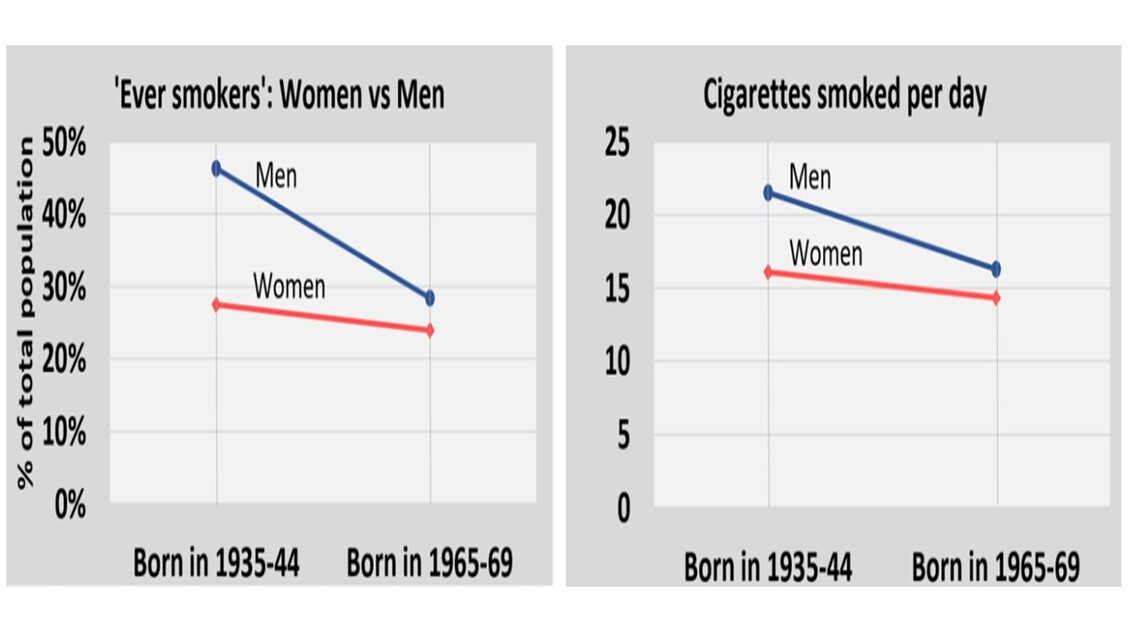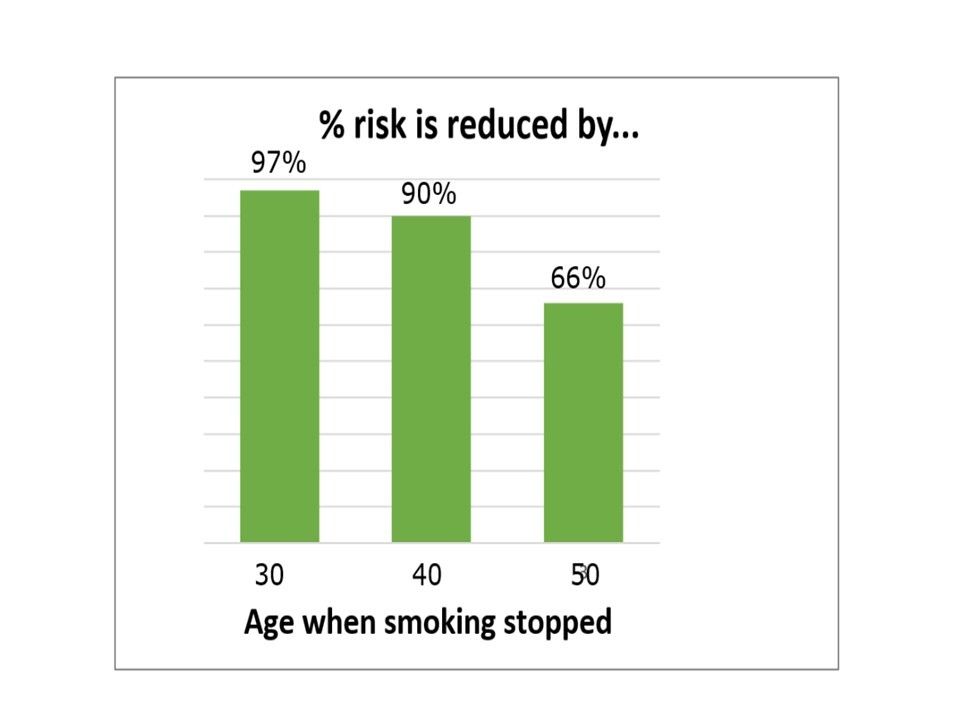Are women at greater health risk from smoking? Why is this? If so, why do some women keep smoking? What difference to your health risk does it make if you give up at 30, 40 or 50?
- Are women at greater risk than men from smoking?
- Chronic illness in women who smoke
- Fertility and pregnancy
- Why do some women keep smoking?
- What’s different about the way women smoke?
- Giving up smoking – help is at hand
- Conclusions
Are women at greater risk than men from smoking?
In 2019 in the UK, 12.5% of women (3.1 million) were identified as smokers.
|
Two-thirds of all deaths among women smokers in the UK in their 50s, 60s and 70s are caused by smoking. Smokers lose at least 10 years of lifespan. The Lancet, 2013 |
That’s one finding from a study of over a million women published in The Lancet in 2013.
According to the NHS, smoking increases the risk of more than 50 serious health conditions, from at least 15 different types of cancers (especially of the mouth, throat and oesophagus) to heart attack, and from stroke to chronic obstructive pulmonary disease – including bronchitis and emphysema – and to pneumonia.
Chronic illness in women who smoke
Worryingly, a number of studies now suggest that smoking causes an even greater risk of chronic illness in women compared both with women who don’t smoke as well as with men who do smoke. These chronic illnesses include:
- Lung cancer: Chronic lung disease: a 21.4 times greater risk than women who don’t smoke.
- a 35.3 times greater risk than women who don’t smoke.
- a higher risk of developing lung cancer than male smokers, although a review published in 2020 showed that not all studies support this finding.
- Coronary Heart Disease (CHD): a 25% greater risk than men who smoke. This was reported in The Lancet in 2011.
However, a 2018 review showed that women appeared to have a similar risk of CHD as men, which increased after menopause. This was supported by a 2020 meta-analysis of heart failure associated with cardiovascular risk factors in 2,095 participants, which also reported a similar risk as men due to smoking.
Fertility and pregnancy
Tobacco use has additional harmful effects on women.
|
Women who smoke are more likely to experience infertility and delays in conceiving than those who don’t smoke. |
Smoking during pregnancy has been associated with premature delivery, stillbirth, and newborn death. Although the rate has fallen by nearly a third in the last 13 years, more than one in ten of all pregnant women in England in 2019/20 were still smoking at the time they gave birth.
Why do some women keep smoking?
Addiction
Scientists think that women keep on smoking because they are less physically dependent on nicotine than men but more behaviourally addicted. Behavioural addiction requires a different approach to help them quit.
Research shows that women experience a stronger craving than men in response to stress, although they obtain equal relief from cigarettes, with or without nicotine.
Emotional dependency
Socio-economic status may also be a factor. For low-income mothers, smoking may be a time-out. This may encourage increasing emotional dependency on cigarettes and might help explain why those who live in the most disadvantaged areas have a greater proportion of smokers and a higher number of cigarettes smoked per day.
Weight control
Another possible explanation is that women may believe that smoking helps them control their weight.
Stopping smoking can lead to weight gain, as nicotine acts as an appetite suppressant and may increase metabolic rate.
However, one in six people actually loses weight after giving up smoking suggesting that other factors such as an improved diet and lifestyle may also be relevant to giving up smoking.
|
A desire to control weight is one possible reason why more girls than boys now smoke. |
Other suggestions
There are several other possible reasons why more girls than boys now smoke. In addition to weight control, other reasons can be to look cool, to look older, to appear independent, for emotional reasons and in response to the way the tobacco industry advertising appeal to girls’ fears and fantasies.
What’s different about the way women smoke?
A study published in 2014 showed that women born in the late 1930s usually started smoking later than men (19 years old vs 17.25), and they also smoked fewer cigarettes a day (16 a day vs 21). This may have masked any greater risk they may have faced from smoking.
However, women born after the 1960s usually started smoking around the same time as men and now smoke only two cigarettes fewer per day. Therefore, any protection women may have had because they started to smoke later and smoked less than men has now been largely removed.
Rates of both male and female smoking in the UK have gradually declined since 1974. (Study was published in 2014)

Why are women at greater risk than men?
One possible explanation is that women are more susceptible to the adverse effects of smoking. This may be related to increased DNA damage and the presence of variations in genes involved in the development of lung cancer. Also, the role of female sex hormones (e.g. oestrogen) may be important, but this requires further investigation.
Alternatively, women may extract a greater quantity of carcinogens and other toxic agents from the same number of cigarettes compared with men, although there is very little evidence to support this.
What we do know is that, whatever the reason, women who smoke could be at greater risk than their male counterparts, who are already at significant risk themselves.
Giving up smoking – help is at hand
|
The good news is that the earlier you give up smoking, the more you can reduce its lethal effects. |
There is also a range of organisations that can help you give up smoking, by providing information, support and resources. You can find help at:
Psychological treatments
In the last few years e-cigarettes have emerged as an option for giving up smoking. Some reviews suggest that e-cigarettes are much less harmful to health than tobacco, but this is not supported by other studies. Also, some health professionals are concerned that e-cigarettes can lead young people into smoking real cigarettes.
Conclusions
- Smoking increases your risk of serious health conditions and of dying younger.
- The risk is greater for women, possibly due to genetic, hormonal or even social factors.
- There has been a big reduction in smoking among men in the last few decades, but a smaller reduction among women.
- This may be because women believe smoking will help them control their weight, or because they tend to become more emotionally dependent on smoking.
- However, giving up smoking early enough can cut the health risks for women by up to 97%.
- There is now a wide range of resources to help you quit, including e-cigarettes.
Reviewed and updated by Barbara Baker June 2021. Next review date 2025
__________________________
Other relevant articles on the Age Watch website:
- Living longer: Look after your body
- Living longer: Tips for a healthy life
- Illnesses: Cancer prevention guidelines
- Illnesses: Heart attack prevention
- Illnesses: Stroke prevention guidelines

